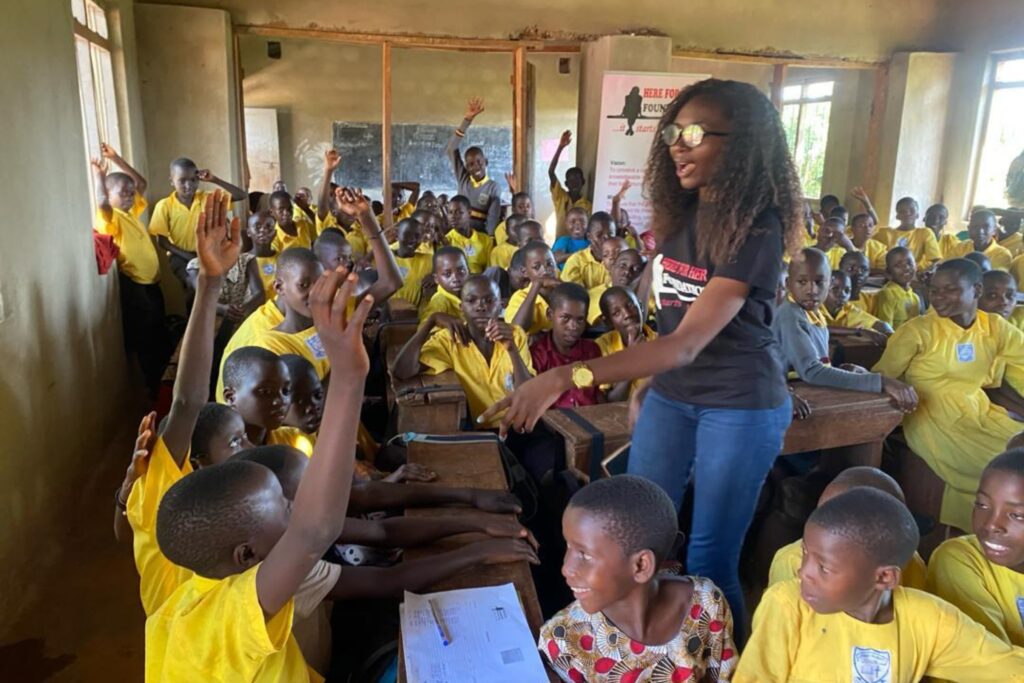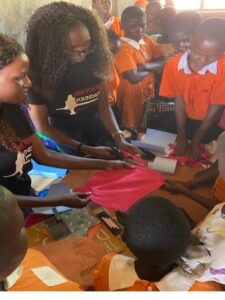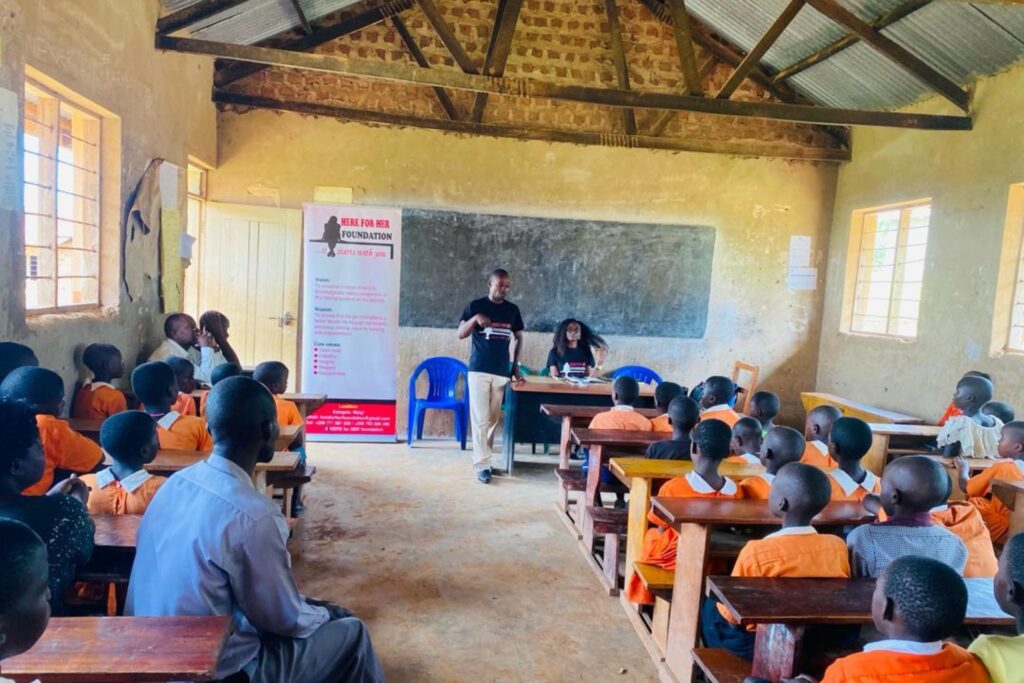500 million girls and women around the world don’t have access to menstrual products or adequate facilities for menstrual hygiene management, The World Bank.
“I hope that one day the world will be a better place for each and everyone,” Resty Nabaggala, Youth Leader ,Development practitioner and Founder of the Here For Her foundation.
The feeling of kinship among women has been the untamable force that has driven the world to innumerable societal changes. The way we — as women — perceive our needs and struggles and how we try to pave the way for the women who will walk through the same path afterward is commendable. This sorority has inspired Resty Nabaggala to promote menstrual education in Uganda so a new generation of women may live in a society that demystifies and promotes the knowledge of this biological change and its proper care and help girls stay in school as menstrual poverty is a front line factor for continued school dropouts.
Resty is a committed and enthusiastic 24-year-old Ugandan youth leader and advocate for gender equality. She has a bachelor’s degree in Business Administration from Mbarara University in Uganda and is currently studying for a master’s degree in Development Studies. She is the founder and director of the community-based organization Here For Her, a member of the Regional Youth Advisory Panel Steering Committee at Plan International, and a member of the Smart Women in Environment and Development Organization and Uganda Youth Coalition for SDGs. She is an ardent advocate for gender equality and youth involvement in development and a researcher.
Resty‘s journey was not an easy one. She was born in a humble family in central Uganda. Her father was a civil servant and her mother was a housewife.
“I was born in a rural area of Mpigi District, the majority of the people are farmers with low literacy levels where poverty, child marriages, gender-based violence, and teenage pregnancies are among the challenges that the community faces,” says Resty. “Many times a girl will have to look for her pads, books, and pens unlike their counterparts the boys, parents who embrace education are more concerned about boys’ education because they assume girls are going to get married or get pregnant along the course of studies due to cultural constructs. However my parents were different and supported me all through. My father always encouraged his daughters to study and he was my greatest inspiration and motivation.”
To pursue her studies, Resty had to leave her hometown, which was a small village. But when she returned to her childhood friends’ something had changed.
“Growing up I had to leave my ancestral home and migrate to the city for some good years but, when I went back to the village, I realized that many of the girls who were my peers had gotten married and some of them already had children and dropped out of school. I found myself in a village of loneliness because I could not interact with anyone,” recalls Resty. “At that time, I did not know what to do and decided to continue with my studies hoping to figure out a solution along the journey, and also wanted to concentrate on my studies to get the best out of it.”
Hardships Shape Liders
Resty wanted to continue her education and attended college through a government scholarship but her resilience was soon put to the test.
“I come from a big family,” recalls Resty. “I wanted to be an engineer but could not live this dream because my dad’s health had deteriorated at that time, there was no money at home and my siblings were the ones supporting me. I decided to take on the government scholarship I had gotten due to my excellent performance even though I never loved the course programme they had given me. I loved studying and this was the only option. Unfortunately, my father passed away when I was in my first year of college. This was a setback for me since he was my biggest motivation but also an eye opener, it was at this point when I realized that the world had officially opened up for me and had to maneuver through it.”
After her family loss and combination of what had happened to her peers, Resty developed a passion for community development and decided to focus her thoughts on helping others. She began by actively participating in college associations and took over leadership in many, as well started volunteering with NGOs.
“During my second year of college, I got an opportunity to volunteer with Action for Youth Development Uganda and I continued there after I graduated, later I worked with the British Council Uganda as well,” says Resty.
After seeing how the joint effort of volunteers could benefit a community, she remembered her hometown and began to think of her village’s needs.
“I knew I had to do something to help my community and that is how the idea of the foundation came to me,” says Resty.

Here For Her Foundation
“Despite the hardships I had gone through to attain an education, at least I had a supportive system around me, idols and the self agency which I thank God for, that never at any point did I think of dropping out of school which I believe my peers I had left behind did not have and I said I would be this to the coming generation.
I didn’t want the next generation of girls to be in the shoes of my peers who were unable to stay in school,” says Resty. “Many teen girls miss school every month and eventually some of them drop out. Others think that the only way to get off menstruation is to get married and be pregnant. So in 2021, I created the foundation Here For Her to promote girls’ and women’s rights, work towards eliminating harmful practices, promote girls’ education, and offer economic and social empowerment.”
 After analyzing why girls were dropping out of school, Resty and her team came up with an initiative to see that girls at least could have the opportunity to attend school to get an education through advocating for elimination of harmful practices that impede girls from accessing education, mentorship provision, providing access to education materials among others.
After analyzing why girls were dropping out of school, Resty and her team came up with an initiative to see that girls at least could have the opportunity to attend school to get an education through advocating for elimination of harmful practices that impede girls from accessing education, mentorship provision, providing access to education materials among others.
“Among the factors we found for girls dropping out of school was the parents’ ignorance. They don’t acknowledge the benefits of an education for girls,” says Resty. “There is also period poverty, poor menstrual management, and stereotypes associated with menstruation, because of this, girls miss school every month and eventually some of them drop out. Some of them think that the only way to get off menstruation is to get married and be pregnant which generates more poverty.”
Period Poverty Around the World
Period poverty is the inability to access menstrual products due to a lack of economic resources. This, as well as the lack of proper facilities for menstrual hygiene management, is a problem that affects around 500 million girls and women around the world, according to The World Bank.
Furthermore, 12.8% of girls and women live in poverty and they may turn to unsafe materials to substitute menstrual products, such as newspapers, toilet paper, plastic bags, socks, clothes, or rags, according to UN Women.
In Uganda, only 25% of girls finished their lower secondary education in 2017, and just 4% of girls enrolled in tertiary education in 2016, according to The World Bank and UNESCO Institute of Statistics.
According to the Menstrual health and school absenteeism among adolescent girls in Uganda (MENISCUS), there is evidence of a link between menstruation and school absenteeism. In fact, for school girls menstruation is a cause of stress. Also, female students miss school 4 times more during their period than when not menstruating. Moreover, 20% of the girls miss at least 1 day of school during their period while 10% don’t attend at all during menstruation.

Pad Her Project
To teach the community about menstrual education and provide reusable sanitary pads, Resty created the Pad Her Project.
“Lack of sanitary towels is among the primary factors for girls dropping out of school,” says Resty. “Many girls don’t attend school during their menstruation days due to lack of sanitary pads, others are laughed at when they go to school and their clothes get stained, parents are marrying off their daughters because they don’t have money and getting pregnant is the only way the girls can get rid of menstruation. The most tragic moment came towards the end of 2020 during Covid-19 lock down when some girls started exchanging their bodies for sanitary pads. To me, this was unbecoming and a violation of girls’ rights,” says Resty.
Through her organization and the Pad Her Project, Resty and her team expect to give away 1,000 reusable pads to girls from 9 to 24 years old while visiting 20 primary and secondary schools from 5 local communities in Uganda. They will give menstrual educational sessions to over 3,000 students, teachers, and parents. They will also train 100 girls to make reusable menstrual pads.
“This is a project that I have had over time. We are going to give reusable pads to girls but also engage them in training on how to make these reusable pads so they can help other girls as well. We will offer menstrual educational sessions in schools for teachers, boys, and girls. The pad training is also offered to boys, girls, and teachers. We also try to engage parents in these sessions, especially men, so that their daughters can go to them and tell them if they need a menstrual item and they can understand this,” says Resty. “We are running the project in the remote areas of Mpigi with the most vulnerable schools where children don’t even have shoes.”
Researching the internet, Resty found The Pollination Project and decided to apply to obtain the funds she needed to buy the sewing machines and the materials to make the reusable pads.
“When I got the email saying we were going to be funded I really didn´t believe it. I was so thrilled, and happy because I just saw my dream coming to life, our dreams coming true. It’s rare to find an organization like The Pollination Project which believes in young people and supports the visions of those of us who are trying to make an impact in the community. Thank you very much.”
Resty and her team will join forces with other organizations in this project such as Action for Youth Development Uganda, Kaleke Kasome organization, Uganda Youth Coalition for SDGs, and Girls Not Brides Uganda. She expects to take her project nationally in the upcoming years.
“I know we may not have done it all but we hope that at least we shall improve menstrual management within the community we are targeting. We want to see that at least 1,000 girls continue studying and at least 100 girls know how to make the pads and a change in the parents’ mindset about menstruation,” says Resty.
Join Us
If you are inspired by this work and have an idea for a project that addresses an issue that you are passionate about, we’d like to invite you to submit an application and together we will build a better, more compassionate future!
If you would like to support the work of more heartivists like this around the world, please visit our donation page and be a part of the change today!


